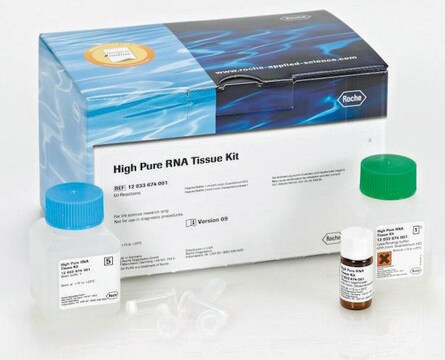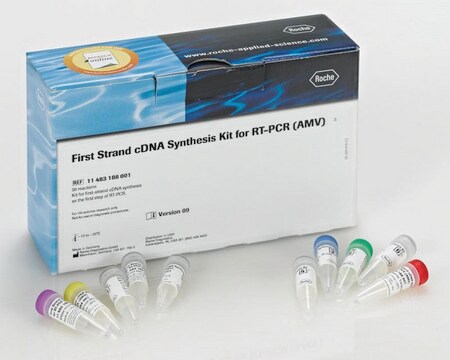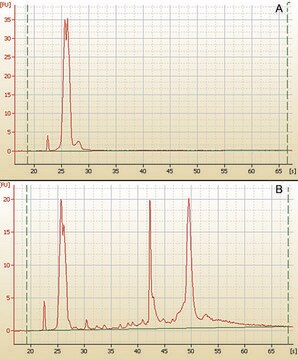추천 제품
사용
sufficient for 10 purifications
기술
RNA purification: suitable
저장 온도
15-25°C
유사한 제품을 찾으십니까? 방문 제품 비교 안내
일반 설명
Procedures such as cDNA synthesis, expression profiling and others require separation of mRNA from the vastly more abundant rRNA and tRNA. The GenElute mRNA kits provide convenient procedures for isolating polyadenylated mRNA from previously prepared total RNA or directly from mammalian cells and tissues.
For direct mRNA preparation, cells or tissues are disrupted with SDS/proteinase K digestion to release RNA and eliminate RNases. The kit uses oligo (dT) covalently linked to 1 μm polystyrene beads to capture polyadenylated mRNA by hybridization. The polystyrene beads remain suspended during hybridization, eliminating the need for mixing or rocking, as is common for cellulose or magnetic particles. Polystyrene was also chosen because oligo(dT) polystyrene beads yield cleaner mRNA with fewer stringent washing steps than does the more commonly used oligo(dT) cellulose (2 or 3 wash steps versus 10 or more). With the GenElute kits, mRNA-bead complexes are washed on a microcentrifuge spin filter, and eluted into 10 mM Tris-HCL, pH 7.5.
Up to 107 mammalian cells or 40 mg tissue are lysed and homogenized, either with the filtration columns provided or with a mechanical homogenizer. RNase is eliminated during a 10 minute proteinase K digestion. Sodium chloride is added, and polyadenylated RNA is captured on oligo(dT) polystyrene beads during a 10 minute incubation. For further enrichment, RNA may be released from the beads into fresh lysis solution and recaptured with the original beads. After 3 washes in a spin column, purified mRNA is eluted in 100 μL of 10 mM Tris-HCl, pH 7.4.
The purified mRNA is ready for Northern analysis, reverse transcription and PCR, labeling for arrays, and other common applications.
For direct mRNA preparation, cells or tissues are disrupted with SDS/proteinase K digestion to release RNA and eliminate RNases. The kit uses oligo (dT) covalently linked to 1 μm polystyrene beads to capture polyadenylated mRNA by hybridization. The polystyrene beads remain suspended during hybridization, eliminating the need for mixing or rocking, as is common for cellulose or magnetic particles. Polystyrene was also chosen because oligo(dT) polystyrene beads yield cleaner mRNA with fewer stringent washing steps than does the more commonly used oligo(dT) cellulose (2 or 3 wash steps versus 10 or more). With the GenElute kits, mRNA-bead complexes are washed on a microcentrifuge spin filter, and eluted into 10 mM Tris-HCL, pH 7.5.
Up to 107 mammalian cells or 40 mg tissue are lysed and homogenized, either with the filtration columns provided or with a mechanical homogenizer. RNase is eliminated during a 10 minute proteinase K digestion. Sodium chloride is added, and polyadenylated RNA is captured on oligo(dT) polystyrene beads during a 10 minute incubation. For further enrichment, RNA may be released from the beads into fresh lysis solution and recaptured with the original beads. After 3 washes in a spin column, purified mRNA is eluted in 100 μL of 10 mM Tris-HCl, pH 7.4.
The purified mRNA is ready for Northern analysis, reverse transcription and PCR, labeling for arrays, and other common applications.
The GenElute™ Direct mRNA Miniprep kit provides a convenient format to isolate polyadenylated mRNA directly from mammalian cells and tissues. The direct mRNA isolation procedure is based on that of Badley. Up to 107 mammalian cells or 40 mg tissue are lysed and homogenized, either with the filtration columns provided or with
a mechanical homogenizer. RNase is eliminated during a 10 minute proteinase K digestion. Sodium chloride is added, and polyadenylated RNA is captured on oligo(dT) polystyrene beads during a 10 minute incubation. For further enrichment, RNA may be released from the beads into fresh lysis solution and recaptured with the original beads. After 3 washes in a spin column, purified mRNA is eluted in 100 μl of 10 mM Tris-HCl, pH 7.4.
a mechanical homogenizer. RNase is eliminated during a 10 minute proteinase K digestion. Sodium chloride is added, and polyadenylated RNA is captured on oligo(dT) polystyrene beads during a 10 minute incubation. For further enrichment, RNA may be released from the beads into fresh lysis solution and recaptured with the original beads. After 3 washes in a spin column, purified mRNA is eluted in 100 μl of 10 mM Tris-HCl, pH 7.4.
애플리케이션
The GenElute Direct Kit mRNA kit provides convenient procedures for isolating polyadenylated mRNA from previously prepared total RNA or directly from mammalian cells and tissues.
특징 및 장점
- Poly (A)+ mRNA isolated from total RNA in 40 minutes or 60 minutes directly from cells and tissues
- Oligo(dT) polystyrene beads require fewer wash steps
- mRNA captured on oligo(dT) polystyrene beads in 10 minutes, with no mixing or rocking
- mRNA captured on oligo(dT) polystyrene beads in 10 minutes, with no mixing or rocking (Fig. 1)
- Poly (A)+ mRNA isolated from total RNA in 40 minutes (Fig. 2) or 60 minutes directly from cells and tissues (Fig. 3)
- Oligo(dT) polystyrene beads require fewer wash steps
기타 정보
Use for isolating mRNA directly from mammalian cells or tissues.
For additional information, please see www.sigma-aldrich.com/mrna.
법적 정보
GenElute is a trademark of Sigma-Aldrich Co. LLC
키트 구성품 전용
제품 번호
설명
- Elution solution 1.5 mL
- Filtration columns with tubes 10 ea
- Lysis solution 20 mL
- 5 M NaCl 1.5 mL
- Oligo(dT)-polystyrene beads .3 mL
- Proteinase K 5 mg
- 40% Glycerol solution .6 mL
- Spin columns with tubes 10 ea
- Collection tube 10 ea
모두 보기 (9)
신호어
Danger
유해 및 위험 성명서
Hazard Classifications
Eye Irrit. 2 - Met. Corr. 1 - Resp. Sens. 1 - Skin Irrit. 2 - STOT SE 3
표적 기관
Respiratory system
Storage Class Code
8A - Combustible corrosive hazardous materials
Flash Point (°F)
Not applicable
Flash Point (°C)
Not applicable
Brahmchetna Singh et al.
Molecular cancer, 6, 82-82 (2007-12-26)
Retinoids are potent growth inhibitory and differentiating agents in a variety of cancer cell types. We have shown that retinoids induce growth arrest in all pancreatic cancer cell lines studied, regardless of their p53 and differentiation status. However, the mechanism
프로토콜
Method for reverse transcription of RNA into DNA. Uses a premixed reagent that contains reverse transcriptase, dNTPs, primers, RNase inhibitor and buffer. Fast generation of cDNA.
자사의 과학자팀은 생명 과학, 재료 과학, 화학 합성, 크로마토그래피, 분석 및 기타 많은 영역을 포함한 모든 과학 분야에 경험이 있습니다..
고객지원팀으로 연락바랍니다.









